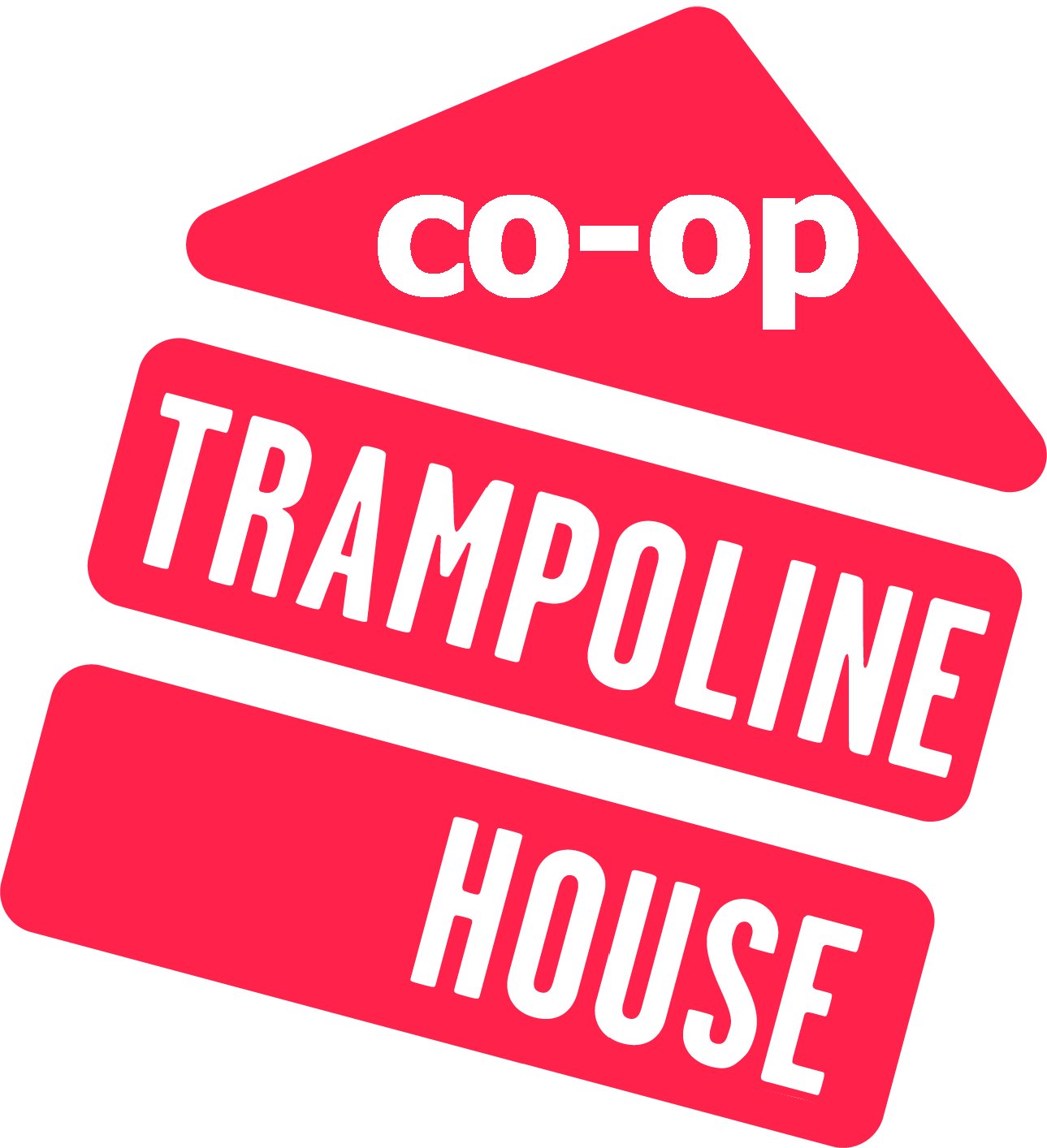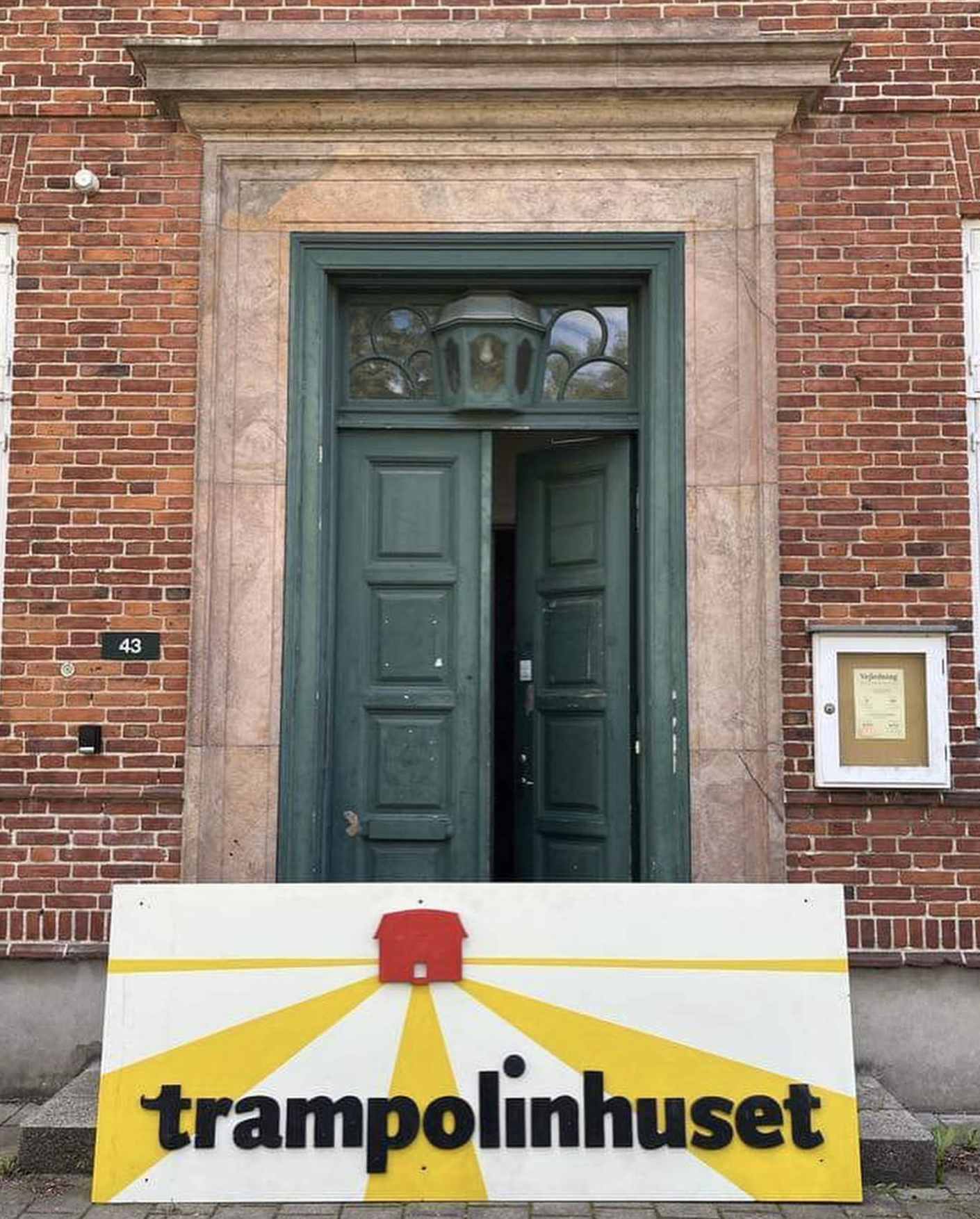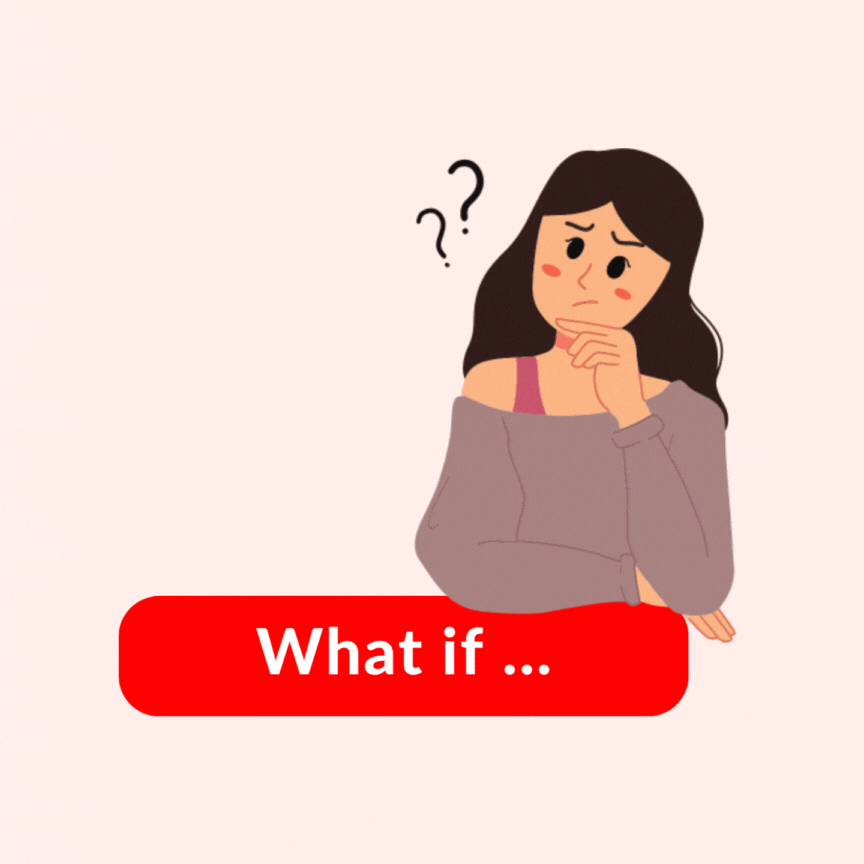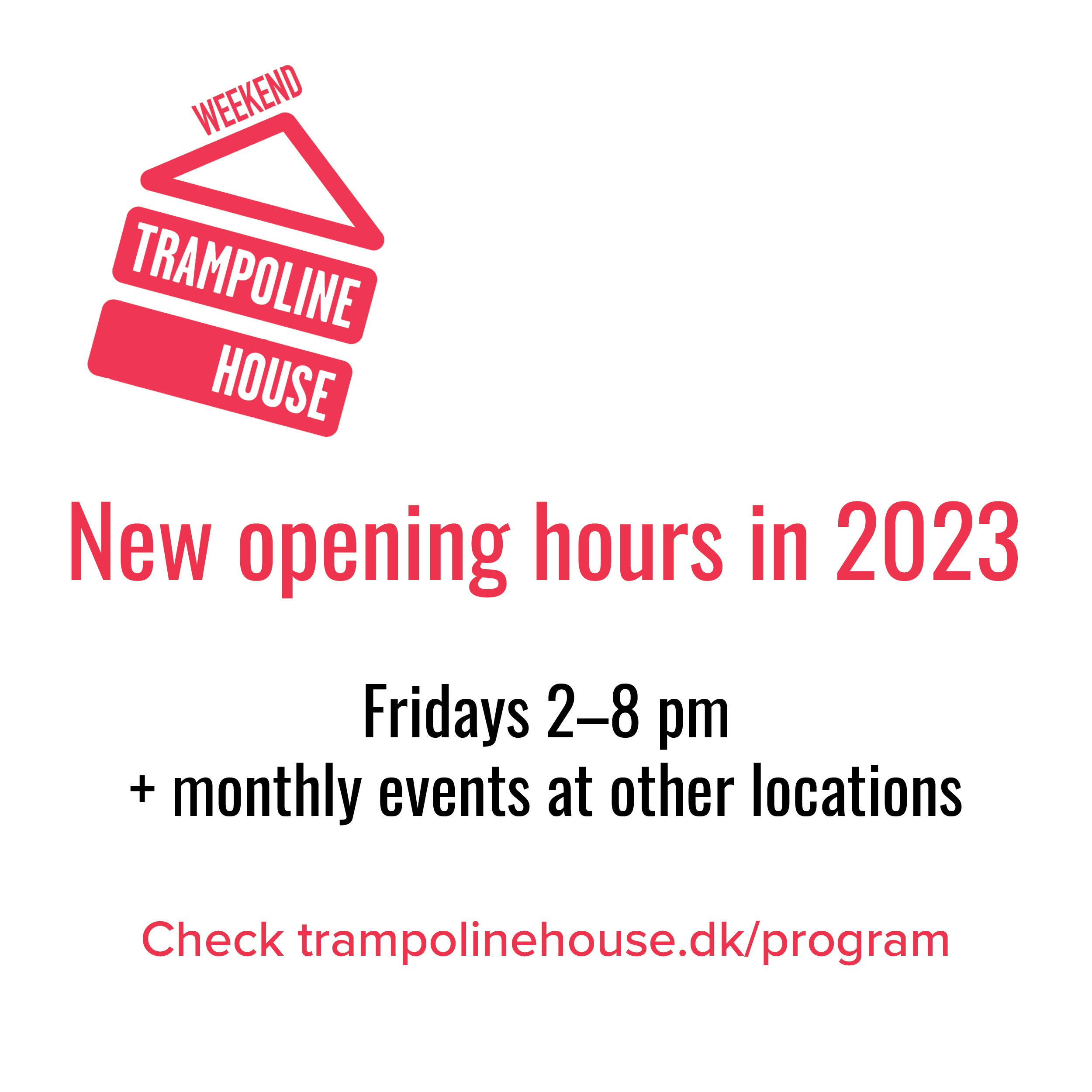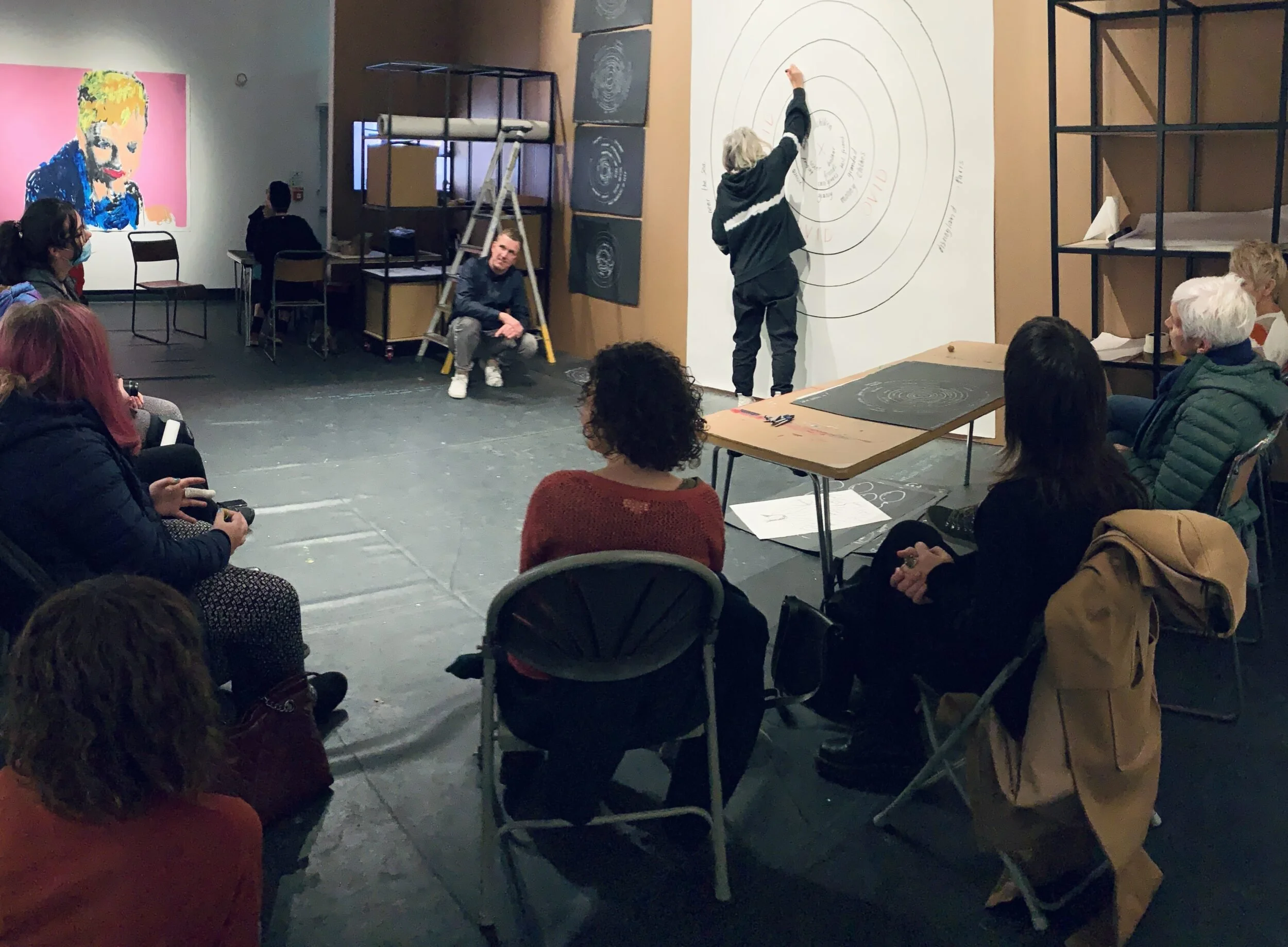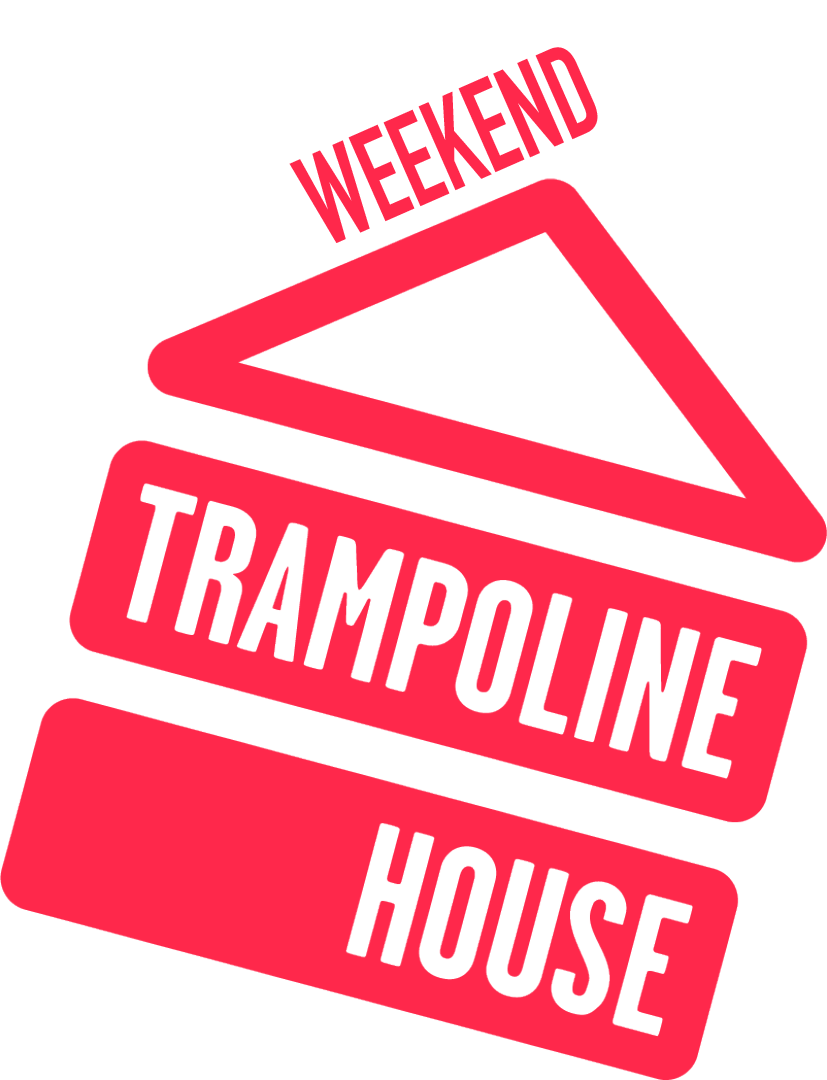Klik her for dansk

From right to left: Masoumeh, Kevin, Omid and Morten participating in an expert panel at Roskilde University. Photo: Anna Emy.
In the beginning of April, Humanity in Action and Roskilde University invited Trampoline House to participate in a workshop about the asylum system in Denmark. 10 people from Trampoline House's democracy class travelled to Roskilde University to join the workshop.
At the workshop, there was an expert panel consisting of four members of Trampoline House: Masoume, Kevin, Omid and Morten. The panel answered questions and shared their insights on the state of democracy in Denmark and the failures of the asylum system. On the question of how to be heard by politicians, Kevin asserted that the problem isn’t being heard; rather that Danish citizens need to hold their politicians accountable for their actions that harm refugees and asylum seekers: “How to reach the politicians… I don’t think that’s the problem. The problem is making them listen to what you’re saying and understanding. It’s like they don’t have anyone holding them accountable for what they’re doing because the Danish people don’t hold them accountable.”
Omid has been an asylum seeker in Denmark for fourteen years, but for the majority of that time, he has been living with his girlfriend in Amager, trying to build a normal life. But now, he lives in deportation center Kærshovedgaard, where rejected asylum seekers and persons on tolerated stay have to stay for an unspecified amount of time. Recounting his experiences facing deportation and the police, Omid voiced his feelings of being trapped by the system: “Whatever we say to the Minister of Integration, she didn’t want to hear. She just says ‘You have to go back to your country. You have to stay in Kærshovedgaard until you go back to your country.’ So I feel that like I am captured. I am not a refugee. Somehow, she told me 'you have to stay here until you die or go back'. So this was her answer. In reality she could not say that to me, but this was the answer. Whatever we told her or whatever I told her. Even though I told her to just put herself in my position and see what is going on. This is really a question of human rights.”
Masoumeh reminded us that the asylum system in Denmark is also a children’s rights issue: “Children in the camps, they feel isolated too, they just need a safe place. In the camp, it is like prison, they cannot go out … my nephew says that when he goes to kindergarten, Danish children do not want to play with him because he does not speak the same languages and he is isolated.”
We concluded the presentation with a group discussion modeled after Trampoline House's weekly house meetings. House meetings are democratic - everyone can attend and contribute to the discussion. Everyone must listen to and respect whoever is holding the 'talking stick'. Similarly, during the house meeting with RUC students, everyone got a chance to share their thoughts and feelings.
We're very thankful that Roskilde University and Humanity in Action invited Trampoline House to contribute to this discussion of the asylum system.
Also check out
We demand justice for stateless refugees in Denmark. March with us in solidarity on June 10 at 1 pm. We gather at Christiansborg Castle Square, from where we march around the inner city, and finish back at Christiansborg for speeches, poetry, and music.
On Saturday, June 17, from 4 pm–01 am, we are throwing a support party for Trampoline House at BumZen on Nørrebro, Copenhagen. Join us with your family and friends for a blast of a party with community kitchen, bar, raffle, DJs and music – and help support Copenhagen's only community center for displaced people❣️
Trampoline House invites the public to a big community meeting about the massive mal-thriving of rejected asylum-seeking children in the Danish deportation system on Thursday, June 1, from 3–5:00 pm at Union, Nørrebro. Come and join us to discuss what we can do!
Trampoline House is hosting a big party on Saturday, April 15 from 6pm–2am in Impact Roasters’ amazing space at Flintholm Train Station 💃🏻🕺🏿🎶 Please come – it’s also your party!
We have just updated our Friday program and event calendar for the Spring 🌱 We have a series of interesting events coming up! Check it out…
Together with five European partners, Weekend Trampoline House has organized a questionnaire survey on young Europeans' attitudes towards refugees and immigrants. The result is discouraging reading to us, but it's good to know the scale of the problem before taking action!
When Weekend Trampoline House opens again after the Christmas holidays on January 6, we will have new opening hours and a new staff member!
Weekend Trampoline House will be closed for the Christmas Holidays from December 19 to January 5. We will open again on Friday, January 6 at 2 pm. Thank you so much for a fantastic 2022 ❤️ Merry Christmas, happy hew year, and see you again in 2023!
🎄 Join us in Weekend Trampoline House for a festive Christmas celebration with Christmas bingo, Christmas film screening, and Christmas community dinner ☃️♥️
On Sunday, December 18, we will continue our free lecture series on the Danish asylum system when Sine Hav from the Danish Refugee Council visits Weekend Trampoline House. She will tell us more about the requirements for applying for a permanent residence permit in Denmark. After the lecture, you are most welcome to join our festive Christmas celebration.
Are you thinking of volunteering in Weekend Trampoline House, or are you already volunteering but have not yet attended an info meeting? Then join this info meeting for new volunteers on Sunday, November 27, from 4–5 pm.
Christmas is coming 🎄⛄️❄️ We celebrate this in Weekend Trampoline House's Children's Club with lots of cozy Christmas activities for children and their parents. Because it's no fun celebrating Christmas in an asylum center or celebrating Christmas in a foreign country you've just fled to. Click to see our festive program 🥨🎁💝´
Please join us in Weekend Trampoline House on Friday, November 11 from 4–7 pm for the launch of the new issue of visAvis, a magazine produced by activists of all backgrounds and passports since 2009. The launch includes readings, film screenings, and food.
The Iranian people from deportation center Avnstrup invite you to their demonstration on Saturday, November 5 at Christiansborg Slotsplads, Copenhagen from 2–4 pm. Iran is not safe – therefore, the Iranians who are living in Danish deportation centres demand to get their asylum cases reopened and not be subjected to the deporation center system!
📣 Are you in Kassel in the coming weeks to see the groundbreaking documenta fifteen exhibition before it closes on September 25, then Trampoline House would be very happy to see you to one of our events about the global north’s dysfunctional asylum policies and how to imagine asylum differently. All events are free and conducted in English. Click to read more 👉👉🏽👉🏿
Weekend Trampoline House now offers free legal counseling to asylum seekers, rejected asylum seekers, and refugees with residence permit in Denmark every second Friday (uneven weeks) from 2–6 pm and every second Sunday (even weeks) from 2–6 pm by Weekend Trampoline House’s legal counselor Michelle Keun-Rasmussen. Click for more info…
Are you thinking of volunteering in Weekend Trampoline House, or are you already volunteering but have not yet attended an info meeting? Then join this info meeting for new volunteers on Sunday, August 28, from 4–5 pm.
Join us for one of this year’s coolest summer parties and support Trampoline House's work for refugees and asylum seekers in Denmark at the same time. The party takes place on August 20 from 6 pm–2 am at Kapelvej 44, 2200 Copenhagen N. Click to read more…
This summer, Trampoline House will be exhibiting art projects, doing performances, and hosting workshops in Germany as part of the major contemporary art exhibition Lumbung – documenta fifteen. Trampoline House is one of 14 lumbung members in documenta fifteen, which will take place over 100 days from June 18–September 25, 2022 in Kassel, Germany.
On Sunday, we will continue our lecture series on the Danish asylum system when Anne Lund Preisler Herbst from the Danish Refugee Council visits the Weekend Trampoline House. She will tell us more about the so-called paradigm shift in Danish immigration policy, which was adopted by the Folketing in February 2019.
We are so proud to announce that Project Art Works, a collective of neurodiverse artists and activists from the UK, will visit Trampoline House from May 20–22 to conduct a workshop with people from the house. Titled "Massaging the Asylum System", the workshop runs over two days and is for people in the Danish asylum system and in the Danish integration program.
📣 Trampoline House is co-organizer of a big demonstration on Sunday, April 17, in Copenhagen, which protests against Denmark's forced deportation practices that divide families and allow the use of force.
On May 1, you can learn more about the poor health conditions of refugees at Europe's borders. It happens when the film festival Global Health Film Days in collaboration with Doctors without Borders Denmark and Weekend Trampoline House invite the public to a film and debate event in the Apostle Church in Copenhagen about the living conditions of refugees and asylum seekers in the notorious Moria refugee camp on the Greek island Lesvos.
Super exciting puppet workshop with Joachim Hamou this Friday in Weekend Trampoline House. The workshop is part of Trampoline House’s contribution to the documenta fifteen exhibition, which takes place in Germany this summer❣️
This Sunday, Dr. Poornima Luthra will conduct a workshop in Weekend Trampoline House on diversity, equality, and inclusion. What we can all do to become an active ally of inclusion. Everyone is welcome!
On Friday, March 11, Michala Clante Bendixen from Refugees Welcome Denmark will pass by Weekend Trampoline House's house meeting to tell us more about the special law for Ukrainian refugees, which is expected to be passed in the Danish Folketing within a few days. Everyone is welcome!
On Sunday, February 27, Mads Melin from the Danish Refugee Council will give a lecture in the Weekend Trampoline House on the asylum procedure in Denmark. Everyone is welcome!
On January 28, 2022, the refugee justice community center Trampoline House re-opens in a smaller version under the name "Weekend Trampoline House" in the Apostle Church's parish house in Vesterbro in Copenhagen. Warm welcome to a festive opening reception from 5–9 pm. There will be live music, light food and beverages, and you can learn more about the new house and how to become a part of it. Click to read more…
Support Trampoline House
Every contribution matters. You can help ensuring that asylum seekers can be part of a community from their first day in Denmark.
It means more than you can imagine.
